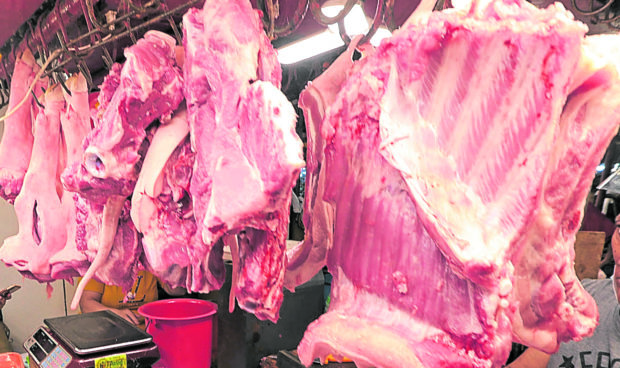Current pork prices already the ‘best deal’ for consumers – importers group

INQUIRER FILE PHOTO / GRIG C. MONTEGRANDE
MANILA, Philippines — The current prices of imported pork meat in Metro Manila markets may be the best deal that consumers may ever get after President Duterte over the weekend raised the imposed tariffs on pork to 10 percent from 5 percent, according to the country’s biggest importer group.
Meat Importers and Traders Association (Mita) President Jesus Cham said in an interview with Inquirer that imported meat prices may have already hit bottom following the compromise struck by economic managers and lawmakers to raise the pork tariffs anew.
Duterte’s Executive Order 134 raised the tariff on pork imports under the minimum access volume to 10 percent for the first three months and 15 percent in the next nine months.
For imports outside MAV, it was revised to 20 percent for the first three months and 25 percent in the succeeding months.
Under the law, duties are imposed upon the entry of cargo. This means that pork shipments that were ordered in April or when the five-percent tariff was imposed may still be slapped with a higher tariff upon arrival. Chances are, they will be.
Article continues after this advertisementAccording to a report by the National Economic and Development Authority, shipments of imported pork are taking time to arrive due to persistent logistics problems worsened by coronavirus-related lockdowns.
Article continues after this advertisementMoreover, the shortage of hogs in countries plagued by African swine fever (ASF) has driven global meat prices up as nations compete with available stocks.
Jerome Ong, president of the Philippine Association of Meat Processors Inc. and CEO of CDO Foodsphere Inc., said imports that were slapped with a 5-percent tariff are expected to arrive in the country by early May, but delayed shipping arrivals and higher freight costs overhauled the usual timetable for arrivals.
While some cargos have already arrived, the volume may not be enough to depress the prevailing meat prices and trim the country’s high meat inflation.
As of last week, price monitoring reports conducted by the Department of Agriculture showed that of the 33 public markets surveyed in Metro Manila, only 13 were able to sell frozen imported pork ham and pork belly. Prices ranged between P225 a kilogram and P350 a kilogram for both cuts.
Most vendors continued to sell fresh local pork priced at an average of P350 a kilo for pork ham and P380 a kilo for pork belly.
Mita, in a letter to selected Cabinet members and lawmakers, requested to extend the validity of reduced tariffs to five years from the current one year even amid the violent backlash from local hog producers.
“One year is definitely too short. Five years is a realistic outlook that producers and political leaders should accept,” said Cham.
“Even local hog practitioners and professionals will agree that if a vaccine [against ASF] is discovered today, it would take two to three years to fully recover. As it is, ASF is still spreading as seen from the reports of BAI (Bureau of Animal Industry),” he added.
Some hog-producing groups threatened to stage a “food holiday” if the five-year extension will be granted by lawmakers or the President, stressing that doing so would ultimately kill the domestic industry and jeopardize the country’s dream of attaining food security.
“If that happens, no one will produce anymore. Piggeries will close. Livestock stakeholders, not only those engaged in livestock but even those who are producing corn and poultry, will unite against that. We will boycott,” said Nicanor Briones, vice president of the Pork Producers Federation of the Philippines.